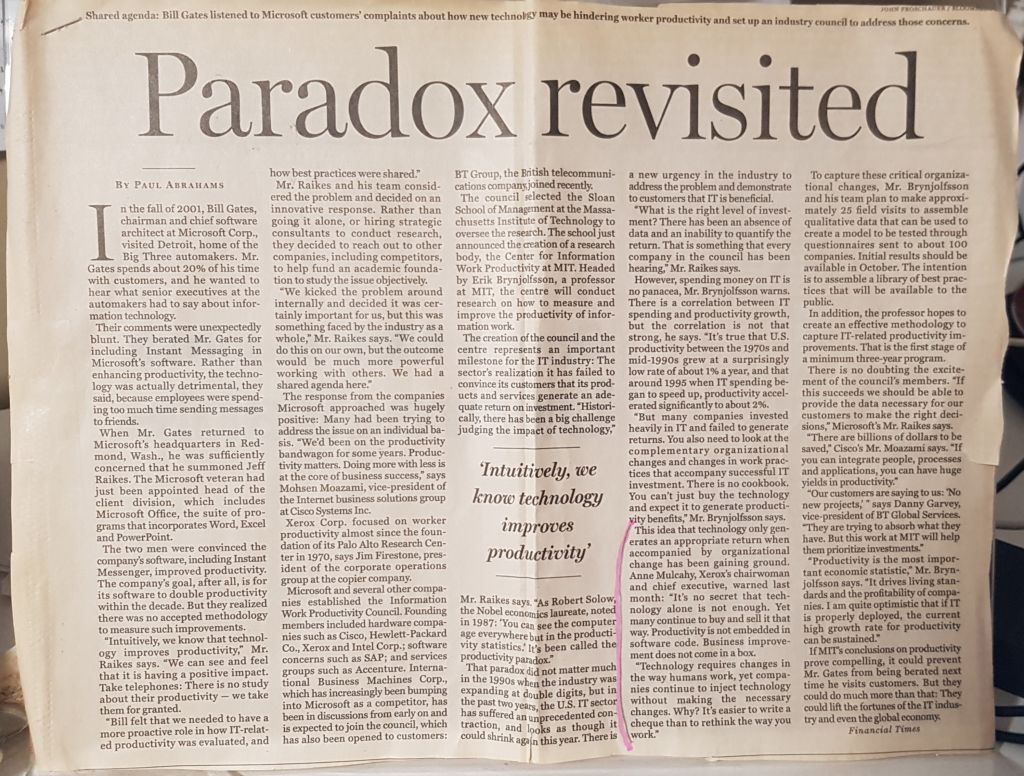MS Messenger was a great idea to help employees communicate but the auto makers complaint about decreasing productivity had no idea what was coming in terms of social media taking productivity to an all new low.
Quote taken from Financial Times article by Paul Abrahams. 2001 article “Paradox revisited”.
Abrahams article was about the impact of information technology and noted criticism from automakers at a conference Bill Gates attended in Detroit in 2001. They collectively criticized Gates for the Messenger feature that they saw as a distraction to employees. The article describes how Gates goes on to organize an industry-based group and had a group at MIT begin a study to determine if Messenger did have a positive impact on productivity.

In hindsight, I would argue that whatever gains that might have been made by making it easier for employees to talk to each other has been grossly eroded by the ubiquitousness of cell phones and as I like to call it, “antisocial media”.
Prior to the internet it was opined that most employees productivity levels was limited, varying on the type of work.
I shall have to follow-up to see what became of the MIT study. Recall this was 2001 and if you have read, “The Walmart Effect”, you’ll know that America solved its productivity problem by closing manufacturing plants and headed for China. OK, not all of them but you get the idea.
The bit I’ve provided below (highlighted in the actual article) jumped out at me given the current trend for Organizational Change going down the IT path. Software presented as the solution for what I used to call “covering your ass with paper”. If employees went through the on-line training and clicked the right answers on the multiple choice questions, then they are now officially trained.
QUOTE FROM ARTICLE:
“This idea that technology only generates an appropriate return when accompanied by organizational change has been gaining ground. Anne Mulcahy, Zerox’s chairwomen and chief executive, warned last month: “It’s no secret that technology alone is not enough. Yet many continue to buy and sell it that way. Productivity is not embedded in software code. Business improvement does not come in a box.
“”Technology requires changes in the way humans work, yet companies continue to inject technology without making the necessary changes. Why? It’s easier to write a cheque than to rethink the way you work””
END OF QUOTE
Boy that covers a lot of territory. I have my doubts about KPI’s and other Organizational Change Software panacea solutions but perhaps it is a start and if continued might produce positive change over a new generation of employees.
My observation regarding change initiatives has been that heads are nodding yes for a need for change, the nodding heads generally mean for everyone else needs to change and not themselves. Maintaining the status quo is paramount. In other words, as Drucker said, “Culture eats strategy for breakfast”.
A simple example of IT technology that works when used properly is CRM software, which generally receives nothing but pushback from sales people when introduced. Particularly old school sales people.
There has been more written about failed change attempts then successful, and if you investigate the successful change initiative, you will likely find that they have slid back to the business as usual. Status quo, unless there had been a significant change in personnel is generally the rule.